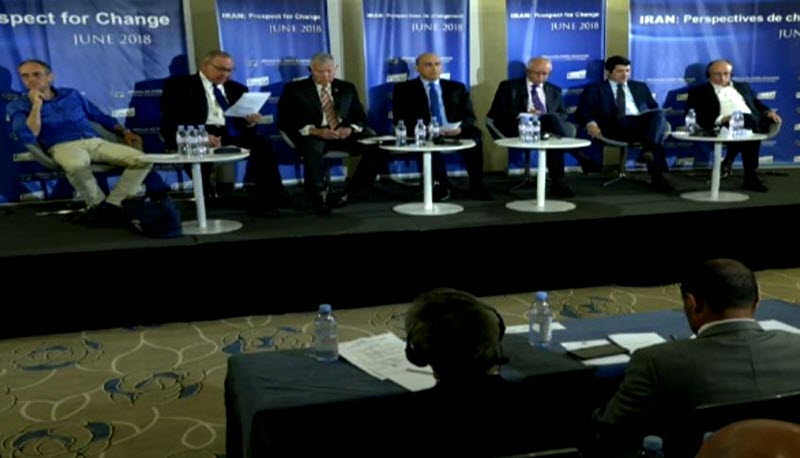
by Staff writer, SF
Global terrorism expert, Walid Phares, moderated a discussion with a selection of prominent military and academic figures on the meddling of the Islamic Revolutionary Guard Corps (IRGC) in the Middle East. The discussion took place ahead of the Free Iran Rally in Paris, the annual gathering of Iranian opposition supporters organised by the National Council of the Resistance of Iran (NCRI) and the People’s Mujahedin Organisation of Iran (MEK).
The Iranian regime relies on the export of revolution for its support within Iran. Meddling in the conflicts of the wider Middle East is a core part of the regime’s ideology. Middle Eastern scholar and writer, Frédéric Encel, accused the Iranian regime of holding a central imperialist ideology.
This ideology drives Iran’s involvement in regional conflicts, which hinges on dividing Sunni and Shiite Muslims, establishing dominance in Iraq and Syria, and creating a united “Shiite crescent” in the Middle East, alongside Hezbollah, the Assad regime in Syria, the Lebanese army, and an extensive network of Shiite militias.
IRGC involvement in Yemen
The IRGC’s activities in Yemen are a glaring example of this ideology in action. Raid Yassine, the former Foreign Minister of Yemen and Yemeni Ambassador in Paris, described the situation in Yemen. The IRGC has stoked religious tensions between Sunnis and Shiite Muslims. It also established an elaborate network of spies, which was discovered in 2012.
The list goes on. Yassine described how in 2013, Yemeni forces intercepted an Iranian vessel which was carrying surface to air missiles and explosives destined for Yemen. In 2016, French forces stopped a fishing vessel off the coast of Yemen and found an arms cache hidden under fishing nets.
A UN panel has concluded that Iran’s IRGC violated an arms embargo on Yemen. The Iranian regime helped the Houthi rebels obtain missiles and place landmines. General Charles Wald, former Deputy Commander of the U.S. European Command, estimated that Iranian missiles were used in 20 to 30 instances against the Saudi-backed forces in Yemen.
Encel commented that Yemeni forces never threatened Iran’s national security. But the regime took advantage of rifts between Yemeni clans and deeply involved itself in Yemeni’s domestic conflict.
Syria offers a similar picture
The IRGC’s activities in Syria paint a similar picture. General James Conway, former Commandment of the U.S. Marine Corps, suggested that there are between 10,000 and 12,000 Iranian troops in Syria, this figure jumps to 50-60,000 when you include foreign-backed Shiite militias.
He said the situation in Syria represents, “the most significant effort by the IRGC… and the most dangerous effort”. Conway estimated that 30 to 60 billion dollars had been spent on behalf of the IRGC’s activities in Syria.
The IRGC has vast resources. Mohammed al-Sulami, the Head of the International Institute for Iranian Studies, estimated that the IRGC controls 40% of the Iranian economy, and enjoys complete control over Tehran’s Khomeini airport. This has allowed the IRGC to spend vast sums of money on its activities abroad. Conway reflected that “it is hard to find a conflict or a suffering people in the Middle East that the IRGC does not touch”.
The IRGC could provoke a wider war
The IRGC’s activities in the Middle East are pushing the region towards conflict. General Conway described how part of General Soleimani’s (the head of the IRGC in Syria) plan is to create a united front with Hezbollah, the Lebanese army, the Assad regime in Syria, and clusters of Shiite militias.
This united front is angering the Israeli government. Having a strong, united Shiite crescent operating near its border will is not tolerable to Netanyahu’s administration. The Israeli military is already considering pre-emptive strikes to weaken the Shiite crescent. According to Conway, this would likely begin with air strikes against the IRGC in Syria but could extend to ground forces around the Israeli border.
How can the IRGC and its activities abroad be stopped?
Conway argued that the situation in Iran is unlike anything we have seen before, and there are opportunities to stop the IRGC’s disruptive activities abroad. For the first time, President Hassan Rouhani has expressed criticism of the IRGC leadership. In response, IRGC General Mohammad Ali Jafari publicly rejected the criticism.
Conway highlighted this exchange as an example of division among the regime leadership and the IRGC commanders. This division is exploitable. If Israel adopts an aggressive stance Rouhani will have to choose whether or not to support the IRGC, at the risk of angering a major Middle Eastern power.
Muhammed al-Sulami championed holding the IRGC accountable through international legal channels. “We have to raise legal issues through international organisations… against the Revolutionary Guards”, he said. We already know that the IRGC violated an arms embargo in Yemen, there would be ample ground for international legal proceedings.
Al-Sulami went on to propose dealing with IRGC activities abroad in the same way that the international community handled other terrorist organisations. Western governments used military force to combat ISIS and Al-Qaeda, al-Sulami suggested handling the IRGC members operating in Syria and Yemen in the same way.
The people will not tolerate it
Encel reminded those in attendance of the dangerous game the regime is playing. The Iranian people are “at log-heads” with their government over the IRGC’s activities abroad. They do not care about Assad and Syria, nor do they care about Yemen. They are concerned about where the money is going.
He argued that the existence of the regime is under threat. The regime needs its outside wars to maintain the support of the Iranian population. However, by continuing to spend astronomical sums on financing foreign rebel groups, it is losing public support. The people will not tolerate it for much longer.







